School Year of Core Vocabulary Words: AAC Resources for Month 5 (December) by Michaela Sullivan, Alisa Lego, & Beth Lytle
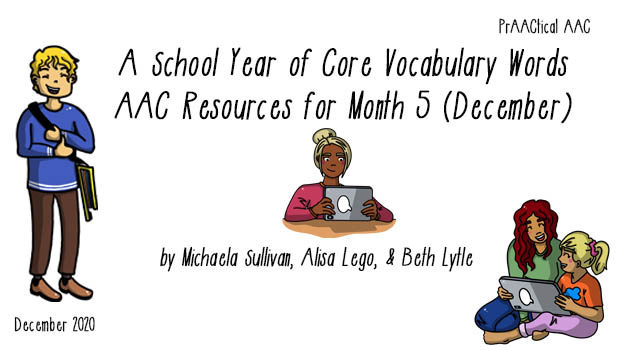
As we prepare to turn the calendar to a new page, take a look at the fifth post in the School Year of Core Vocabulary Words series which is replete with resources for December core words. Guest authored by Michaela Sullivan, Alisa Lego, and Beth Lytle, this series focuses on a selected set of words along with a suggested order in which to teach them. The Activity Packets, containing sheets on highlighting these words in a variety of activities, and Data Collection Forms.
In today’s post, they focus on ensuring that the AAC system is available all throughout the day.
New to this series? Check out the guest authors’ overview here.
Happy reading!
A SCHOOL YEAR OF CORE WORDS: DECEMBER
by Michaela Sullivan, Beth Lytle, & Alisa Lego
To the parents, teachers, Speech-Language Pathologists, Paraprofessionals, friends, and other curious professionals or communicators – welcome back to the monthly School Year of Core Words- December Edition. If this is the first time you’re visiting this posting, we welcome you and hope that you find our resources helpful in teaching and implementing the targeted core words for the month of December. If you’re returning, we hope that you find our resources increasingly interesting, fun, and engaging. Focusing on core words can seem like a complex process, but our hope is that you find our resources and ideas readily accessible, organized, and functional.
2020 has brought so many unprecedented challenges for all of us and our students too. We are all navigating a new space and the best part is we are navigating it together. Our hope is that during these holidays you find more reasons than ever to celebrate. Whoever you choose to celebrate with, and regardless of what holiday you recognize – there is always something to celebrate. This year our team is celebrating connection and building a community around all of our students and with each other!
If you’ve ever considered joining us, please do so and become a part of our community of learning and sharing.
Enjoy Month 5 of the School Year of Core Words!
THE WORDS
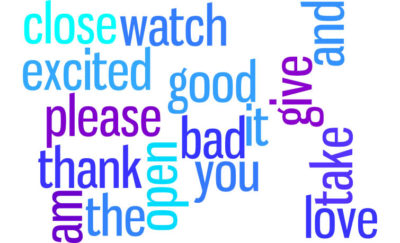
Level 1 words for December: it, am, and, good, bad, love, give, take, watch, excited, open, close, the, please, thank you
The suggested sequence for implementation is listed below:
- Week 1: it, am, and, good
- Week 2: bad, love, give, take
- Week 3: watch, excited, open, close
- Week 4: the, please, thank you
 Level 2 words for December: her, him, choose, shop, leave, wrap, drive, fly, ask, believe, wish, fold, carry, bring, decorate, buy
Level 2 words for December: her, him, choose, shop, leave, wrap, drive, fly, ask, believe, wish, fold, carry, bring, decorate, buy
The suggested order for these words is listed below:
- Week 1: her, him, choose shop
- Week 2: leave, wrap, drive, fly
- Week 3: ask, believe, wish, fold
- Week 4: carry, bring, decorate, buy
THE SYMBOLS
You can download grids with the symbols for this month’s words from the lists below. These handy tools can help us remember what words to focus on and be useful in our intervention and instruction.
Level 1 Words
- Avaz
- CoughDrop
- LAMP Words for Life
- Wordpower 60 Basic
- Unity 45 Sequenced
- Unity 60 Sequenced
- Unity 84 Sequenced
- Blank Grid (add your own symbols)
Level 2 Words
- Avaz
- CoughDrop
- LAMP Words for Life
- Wordpower 60 Basic
- Unity 45 Sequenced
- Unity 60 Sequenced
- Unity 84 Sequenced
- Blank Grid (add your own symbols)
THE ACTIVITIES
These sets of Activity Packets are divided into weeks and can be downloaded for easy access.
Activity Packets for Level 1 Words
Activity Packets for Level 2 Words
STRATEGY OF THE MONTH:
Ensuring the AAC System is Available at All Times
According to the United Nations, communication is a human right and for those who work with individuals who use Augmentative 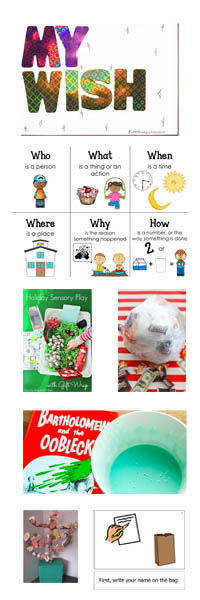 Alternative Communication (AAC), we realize the urgency in making sure their system(s) are available at all times. We also realize that accessibility across settings cannot occur without the provision of training, coordination, and planning and so such implementation supports remain the cornerstone of what we do. We also know that the depth and breadth of such support and habituation of use are only within reach with targeted planning and teamwork. As a team, we determine potential opportunities in daily life, the community, at home, school, and work.
Alternative Communication (AAC), we realize the urgency in making sure their system(s) are available at all times. We also realize that accessibility across settings cannot occur without the provision of training, coordination, and planning and so such implementation supports remain the cornerstone of what we do. We also know that the depth and breadth of such support and habituation of use are only within reach with targeted planning and teamwork. As a team, we determine potential opportunities in daily life, the community, at home, school, and work.
We all long for the dream-team, where everyone, and I mean everyone, takes the ball, (with the ball, being the AAC system) and runs with it all day long, but realistically and truthfully, the reality is that it takes time and work. Is it possible? Without question it is.
So where do we start?
Include the whole team from the very beginning
During the AAC evaluation, we can include the entire team in the selection and trial process, which provides built-in training and modeling opportunities so that once the individual receives the system, there is familiarity, collective understanding, and buy-in on the part of the supporting team who ensures access to the AAC system.
Provide Team Training and an Implementation Plan
Team training is still necessary beyond understanding, familiarity, and use. Training can focus on providing Aided Language Stimulation modeling and other AAC strategies for implementation. Additionally, the team may need support with programming, troubleshooting, participation opportunities, and individualization of the system. The team may need direction and support on what core words to teach and how to do so or how to infuse the use of AAC with reading and writing, social interactions, and mainstreaming. AAC team training is an ongoing process.
Provide a low-tech back-up
Once the individual receives the system, the team can make sure that in addition to any electronic system, that there is a low-tech back up that can be used if the system malfunctions, runs out of power, or cannot be utilized in a special circumstance, (e.g. bathtub, swimming pool or any special situation).
Portability, Durability, and Accessibility
During the AAC assessment, a large focus is placed on portability, durability, and accessibility in making sure the individual has access to their communication system. Making sure the system has a strong, durable case, screen protector, and strap, handle or harness for portability is paramount. For individuals with orthopedic impairments, individuals may need the device mounted on a wheelchair, table or accessible on an adjustable floor mount for independent accessibility.
Keep the system charged and stored in the same place
An electronic device is useless without a charge/power. Making sure that the system is fully charged at the start of the day is necessary. It is also recommended that the individual has access to a charger just in case it is needed.
Please find the following additional resources on ensuring the AAC system is available at all times below. These resources will be helpful for individual learning and/or for team training.
- Do’s and Don’ts of AAC- Access to AAC- Assistiveware
- All the Time and Everywhere by the AAC Community- A project of TechOWL @ Institute on Disabilities at Temple University
- Evidenced Based Instructional Practices For Young Children with Autism and other Disabilities (Chazin, K. T., Quinn, E. D. & Ledford, J. R. (2016))
- PrAACtical Perspectives: Normalizing AAC with Special Educator Amy Campbell
- Why is Communication a Basic Human Right?
- Backups for Backups (This is a conference session from AAC in the Cloud presented by a young man with Autism and how he created low-tech back-ups for communication in ingenious ways.
DATA COLLECTION & ACCOUNTABILITY FORMS
Taking data to measure performance and keeping track of our own modeling behavior are two things we can do to strengthen our AAC teaching. Here are some forms that you can use to support those efforts.
Our hope and belief were that once our Activity Sheets reached others, some would be able to relate to our approach and join us in our quest to share, too… and since our first posting in August, as of November 12th, we are proud to announce that we have welcomed 33 Featured Core Contributors who will be sharing their ideas, resources and time to selflessly create Activity Sheets filled for you to use in your practice.
Our Featured Core Contributors for the Month of December include:
-
- Molly Hartzel
- Sophie Goodwin
- Jamie Deiner
- Liz Cambra
- Jessica Oseguera
- Jordan Stuhltrager
- Kelsey Robin
- Abbie Duarte
- Amy Burt
- Andriana Nikolau
- Shanaz Faisal
- Sam Lin
- Meaghan Rose Baron
- Beth Kenney
- Diana V. Angele
- Alice Mui
We would like to invite you to join our Core Community to share your ideas with us as we post and share them with others. Our Core Community is all about helping one another by providing monthly resources to help support you and your students. To join our Core Community please email one of us with your ideas and resources and you will be recognized as a featured contributor.
This posting is dedicated to all of you SLP’s, parents, educators and therapists who are making a difference every day!
About the School Year of Core Vocabulary Series Authors
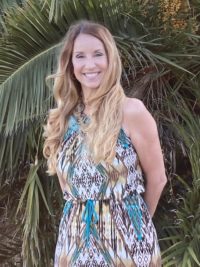 Michaela Sullivan is an SLP who specializes in the fields of AAC and AT. She currently works within the San Francisco Unified School District on the AAC Support Team where she supervises graduate students, works in a transition program and on special projects. Ms. Sullivan is also an AAC and AT Team member within the San Mateo Unified School District where she developed an AAC Mentorship program. Ms. Sullivan also has a private practice. She has been a presenter in the field of SLP and AAC at state and national conventions. She serves as a board member and volunteer for the Nika Project, providing services, supports, resources, training, and repurposed equipment for individuals with complex communication needs both locally and internationally.
Michaela Sullivan is an SLP who specializes in the fields of AAC and AT. She currently works within the San Francisco Unified School District on the AAC Support Team where she supervises graduate students, works in a transition program and on special projects. Ms. Sullivan is also an AAC and AT Team member within the San Mateo Unified School District where she developed an AAC Mentorship program. Ms. Sullivan also has a private practice. She has been a presenter in the field of SLP and AAC at state and national conventions. She serves as a board member and volunteer for the Nika Project, providing services, supports, resources, training, and repurposed equipment for individuals with complex communication needs both locally and internationally.
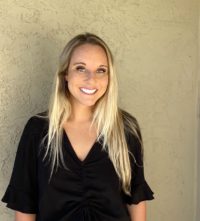 Alisa Lego is a second-year graduate student and candidate for Master’s of Science in Speech, Language and Hearing Sciences at San Francisco State University. Alisa is specializing in AAC through San Francisco State University’s federally funded Project Building Bridges. Alisa is also a candidate for the Autism Spectrum Graduate Certificate. Through Project Building Bridges, she has joined the Nika project and is providing resources for individuals with complex communication needs both locally and across the globe. You can follow Alisa on Instagram at @newfriendscollective.
Alisa Lego is a second-year graduate student and candidate for Master’s of Science in Speech, Language and Hearing Sciences at San Francisco State University. Alisa is specializing in AAC through San Francisco State University’s federally funded Project Building Bridges. Alisa is also a candidate for the Autism Spectrum Graduate Certificate. Through Project Building Bridges, she has joined the Nika project and is providing resources for individuals with complex communication needs both locally and across the globe. You can follow Alisa on Instagram at @newfriendscollective.
 Beth Lytle is a second-year graduate student and candidate for Master’s of Science in Speech, Language and Hearing Sciences at San Francisco State University. Beth is specializing in AAC through San Francisco State University’s federally funded Project Building Bridges. Through Project Building Bridges, she has joined the Nika project and is providing resources for individuals with complex communication needs both locally and across the globe.
Beth Lytle is a second-year graduate student and candidate for Master’s of Science in Speech, Language and Hearing Sciences at San Francisco State University. Beth is specializing in AAC through San Francisco State University’s federally funded Project Building Bridges. Through Project Building Bridges, she has joined the Nika project and is providing resources for individuals with complex communication needs both locally and across the globe.
You can find posts for previous months in the School Year of Core Vocabulary Words below.
Filed under: Featured Posts, PrAACtical Thinking
Tagged With: core vocabulary, Education & Schools
This post was written by Carole Zangari
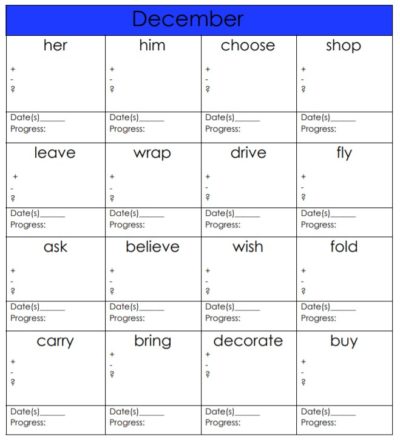

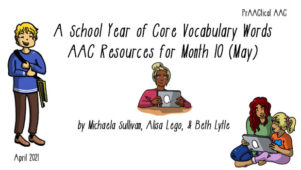
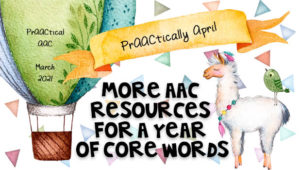
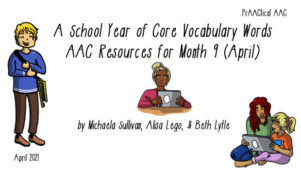
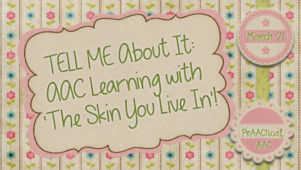
7 Comments
Thanks for all this!!!! Awesome!
Thanks so much for this! It’s been so invaluable during distance learning. Just an FYI the info for Open is on week 3 twice and there is no info for Closed.
Hi Caitie,
Wow! Thanks so much for noticing this and brining it to our attention. It is being fixed right now!
Caitie, thanks for alerting us to this. The post has been edited with the link to the corrected set: http://praacticalaac.org/?wpfb_dl=483 .
Thanks for letting us know, Caitie. I think that is fixed now.
I am a special education teacher and I have asked my SLPs, as well as looked and looked for curriculum/ guidance/ protocols/ processes/ scaffolding, anything other than just the general “ask questions”, “have them identify known objects, and their wants/needs”. For some students I have had, those things lead to them being able to use the device more and more. Yet others I have especially those who haven’t gotten a device until they were older, continually struggle, I really wanted clear direction on how to teach a child to use a device methodically. I can’t say it loud enough THANK YOU!!!
Brittany, thanks for taking the time to comment and for your kind words. I think they are doing a terrific job with this series!